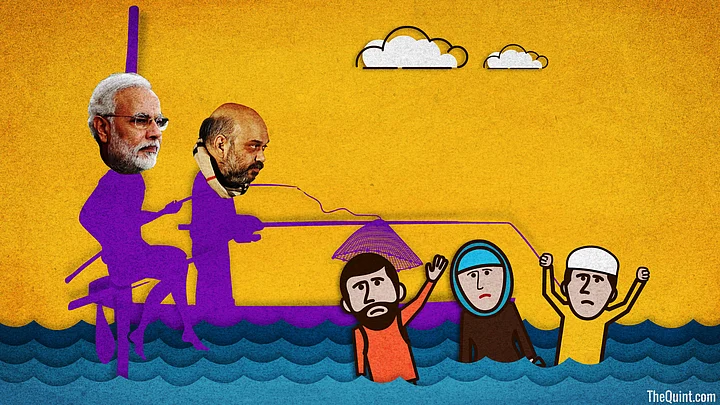Prime Minister Narendra Modi’s assertion that the BJP as a ruling party should “reach out to Muslim backwards” is seen as a crucial shift in the party’s stated political position. The BJP, it is argued, has started behaving like an inclusive ‘national party’ and this is the reason why it responds to the debates on Muslim marginalisation in a positive way.
This conclusion is very instructive, especially in the post-UP election scenario. However, there is a need to go beyond the given ‘politically correct’ reading of this statement simply to explore the complexities of Muslim politics of backwardness.
The BJP speaks of Muslims in two distinct ways – as a closed and homogeneous social group, which does not satisfactorily respond to the nation’s patriotic demands; and as an unimportant constituent of a larger national community (therefore, they should not be treated exclusively as a minority group!).
Although the ‘nationalism’ of Muslims is still seen as an important concern, the party leaders, especially after the 2014 victory, tend to evoke the “sabka sath sabka vikas” slogan to avoid questions related to Muslim backwardness and marginalisation.
Affirmative Action or New Constituency?
In such a context, two questions are relevant:
(a) Is the government keen to offer the benefits of affirmative action to Muslim backwards?
And/or
(b) Is it a serious move by the BJP to create a new political constituency called ‘Muslim backwards’?
These questions are also important because it has been asserted that a sizeable number of Muslim women, OBCs and the poor had voted for the BJP in UP.
The present debate on Muslim backwardness is inextricably linked to proposed changes in the Backward Classes Commission. The Constitution (One Hundred and Twenty-Third Amendment) Bill, 2017, which has already been passed by the Lok Sabha, seeks to repeal the National Commission for Backward Classes Act, 1993.
This new amendment Bill proposes to constitute the National Commission for Socially and Educationally Backward Classes (NCSEBC), a constitutional body, which shall have powers to hear grievances of socially and educationally backward classes. The Bill is in Rajya Sabha at the moment.
Direct Implications
If NCSEBC is constituted, it will certainly have direct implications on backward communities among Muslims. However, such possibilities need to be analysed in relation to the demands posed by the various Pasmanda Muslim groups. The Political Agenda of Pasmanda Muslims in Lok Sabha Elections, 2014 is relevant here.
This declaration made two demands – (a) inclusion of Muslim and Christian Dalits in the Scheduled Caste category; (b) restructuring the OBC category by creating a quota for Extremely Backward Castes (EBCs) within the OBC quota at the Central and state levels.
SCs as Religion-Neutral
These two demands, we must note, are concerned with greater secularisation of affirmative action policies. The SC status is still reserved for Hindu, Sikh and Buddhist caste groups.
The inclusion of Muslim and Christian Dalits, in this sense, will make the SC category religion-neutral. Similarly, the argument for the creation of EBCs on the basis of socio-economic backwardness, underlines a strong secular impulse.
In fact, it takes us beyond the famous special quota for minority within the OBC category thesis, which has been proposed by the Congress and the Samajwadi Party (SP) in the past. This leads us to the second question:
Is it possible for the BJP to woo Muslim backwards?
Crucial Shift
CSDS-Lokniti NES data offers us some interesting findings. In the 2014 Lok Sabha election, the BJP received around 9 percent Muslim votes at the all-India level. This was a crucial shift because it marks a significant 3 percent swing of Muslim votes towards the BJP (in comparison to 2009 Lok Sabha election).
If we unpack this 9 percent Muslim support, the BJP emerges as the third possible choice for upper caste Muslims at the all-India level. In fact, the upper caste Muslims’ response for BJP was slightly higher than the Muslim OBCs support for the party.
The class factor among Muslims further complicates this story. The poor Muslims did not find the BJP as a viable alternative. However, this was not the case with lower and middle class voters. They tend to vote for the party in a significant way. This might be a reason why the BJP (along with the SP) emerged as the second national choice for middle class Muslims.
Greater Interest
These findings suggest that unlike Muslim backwards, their middle class-upper caste brethren are showing greater interest in the BJP as a political choice. Modi’s statement, it seems, points towards the BJP’s pro-poor image makeover campaign, especially in the state where the party is hoping to capitalise on the agenda of social justice.
It would be interesting to find out the location of Muslim backwardness in this pro-OBC political configuration.
(The writer is assistant professor, Centre for the Study of Developing Societies, and Rajya Sabha Fellow 2015-2016. He can be reached @Ahmed1Hilal. This is an opinion piece and the views expressed above are the author’s own. The Quint neither endorses nor is responsible for the same.)
(At The Quint, we question everything. Play an active role in shaping our journalism by becoming a member today.)
